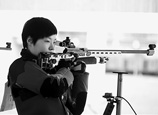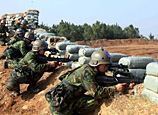
The above-ground subway exits can also be sealed off in the event of an attack, said Liang, as there are also heavy doors concealed behind a temporary wall, which can easily be removed.
English tutor Zhao Zhenliang, who often commutes by subway, said this is the first time he has heard about this civil defense infrastructure.
"It sounds quite cool to me, but what's the use of hiding in the subway if there's a nuclear attack?" he said.
"But generally speaking, having more shelters in town is always better," he said, "it will make residents feel safer to some extent."
Cao Yanping, deputy director of the supervision office of the Beijing Municipal Civil Air-Raid Shelter, said at the conference Tuesday that it has been a difficult project to install all the new infrastructure.
"Some civil defense infrastructure in the Beijing Subway will be installed later after the subway lines are opened this year because of various reasons," he said, although he did not specify what these are.
















 Challenges remain for smoking ban
Challenges remain for smoking ban


![]()
